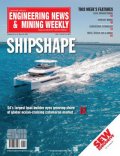Businesses must avoid a knee-jerk response to crisis events like a ratings downgrade, says Deloitte
This article has been supplied as a media statement and is not written by Creamer Media. It may be available only for a limited time on this website.
A raft of weak economic factors and political uncertainty have created a “perfect storm” for the economy, but there are crucial steps businesses can take to limit the damage and ensure they can ride through the storm, says Rob Moody, Associate Director, Debt Advisory at Deloitte Capital.
South Africa’s economy was given a reprieve in early May when the ratings agency, Moody’s, retained the country’s investment-grade rating, and over the weekend S&P adopted a similar stance. Fitch – the smaller of the ratings agencies – took the decision today to retain SA’s investment-grade rating and surprised many by keeping it on a stable outlook.
The fact that SA is on a negative watch by two of the larger agencies means there is still a risk of a downgrade before the end of the year, or early next year, unless economic and political conditions improve. In this environment, businesses that focus on long-term and sustainable solutions can avoid becoming a statistic of the inevitable volatility..
“It is imperative that businesses plan and strategise to improve their financial and strategic outcomes,” says Moody. If a downgrade does happen later in the year, Deloitte expects the full impact on businesses to be felt over the short to medium term – from six months to one year afterwards. “There may be a blip and then a period of ‘things going back to normal’, but over time a number of further negatives and challenges will come into play and companies will potentially struggle to keep their heads above water if they have not taken proactive steps to make their organisations more resilient to these types of “trigger” events” says Moody.
Based on research of what traditionally happens following a downgrade or a major crisis event, Deloitte believes that a company’s priority should be on margin management, revenue maintenance and growth, balance sheet maintenance and strengthening as well as the management of risks and expectations of all stakeholders.
According to Deloitte’s Volatility Response Framework, a reduction of costs requires “robust cost discipline. It could be achieved by automation, value chain re-engineering and optimisation, turning fixed costs into variable costs, leveraging partnerships to manage selling, general and administrative expenditure and proactively managing “revenue leakages”, among others. “If your business is repaying expensive debt it will also be worth restructuring and refinancing,” says Moody.
Innovation is key when looking to grow revenue in these tough times, but the use of technologies and new ways of doing business must be considered. “Expansion by organic growth or acquisition would allow a business to gain scale that makes the cost base more efficient,” says Moody.
Meanwhile, businesses should also allow their assets to “sweat” more by ensuring they work most efficiently given the growth strategy and cost of debt. Disposal of unprofitable non-core assets can also improve the funding ratios that any funder will look to consider - the more favourable the ratios the more favourable the borrowing terms. “It is also imperative to always make sure the working capital and sustainable cash flows are secured,” says Moody.
Crucially, sound expectations management strategies will reduce the overall risks to the business without impinging on profitability or revenue.
The challenge, says Moody, is to match the risk and appetite to the business. “This can be achieved by improving the transparency in financial reporting allowing management to have a finger on the pulse of the business,” he explains. Managing all the stakeholders’ expectations takes a particular skill set and will require time and effort by management, but the rewards should outweigh those in favour of the future longevity of the business. All these factors are critical for business owners and managers to consider, especially during tough trading conditions, which can be exacerbated by events such as a ratings downgrade.
Two of the five BRICS countries (Brazil and Russia) have already been downgraded and therefore provide an indication of what South Africa can expect following a similar downgrade. Russia’s downgrade took place in January 2015 and Brazil’s in September 2015, and in both cases there was a recovery of US Dollar denominated bond yields after the initial shock, though not back to the same level.
While political and global macro-economic instability are factors that will continue to feed volatility, the ongoing commodity slump for a resource-dependant country remains concerning.
“No company is really shooting the lights out globally and as these are our main trading partners, getting our economic growth above 1% and closer to 5% remains our number one challenge. Until we get closer to 5% growth the volatility and uncertainty will continue,” says Moody.
A full volatility decision framework needs to be designed to give businesses an integrated solution focused on the preparation, identification and treatment of any crisis event. A ratings downgrade is just one among many a business may face going forward. This will ensure that the business is adequately prepared for any similar future headwinds.
“In the end result, only companies that employ a full crisis management approach will survive and even thrive in the crucial months ahead,” says Moody.
Comments
Press Office
Announcements
What's On
Subscribe to improve your user experience...
Option 1 (equivalent of R125 a month):
Receive a weekly copy of Creamer Media's Engineering News & Mining Weekly magazine
(print copy for those in South Africa and e-magazine for those outside of South Africa)
Receive daily email newsletters
Access to full search results
Access archive of magazine back copies
Access to Projects in Progress
Access to ONE Research Report of your choice in PDF format
Option 2 (equivalent of R375 a month):
All benefits from Option 1
PLUS
Access to Creamer Media's Research Channel Africa for ALL Research Reports, in PDF format, on various industrial and mining sectors
including Electricity; Water; Energy Transition; Hydrogen; Roads, Rail and Ports; Coal; Gold; Platinum; Battery Metals; etc.
Already a subscriber?
Forgotten your password?
Receive weekly copy of Creamer Media's Engineering News & Mining Weekly magazine (print copy for those in South Africa and e-magazine for those outside of South Africa)
➕
Recieve daily email newsletters
➕
Access to full search results
➕
Access archive of magazine back copies
➕
Access to Projects in Progress
➕
Access to ONE Research Report of your choice in PDF format
RESEARCH CHANNEL AFRICA
R4500 (equivalent of R375 a month)
SUBSCRIBEAll benefits from Option 1
➕
Access to Creamer Media's Research Channel Africa for ALL Research Reports on various industrial and mining sectors, in PDF format, including on:
Electricity
➕
Water
➕
Energy Transition
➕
Hydrogen
➕
Roads, Rail and Ports
➕
Coal
➕
Gold
➕
Platinum
➕
Battery Metals
➕
etc.
Receive all benefits from Option 1 or Option 2 delivered to numerous people at your company
➕
Multiple User names and Passwords for simultaneous log-ins
➕
Intranet integration access to all in your organisation


















